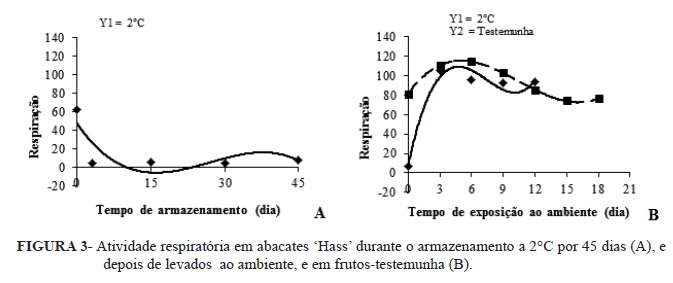This study aimed to determine the occurrence of chilling injury in 'Hass' avocado. In the first step, the avocados were stored at 5ºC (77% RH), 10°C (79% RH), and 15ºC (79% RH) for up to 21 days. At 7, 14, and 21 days of storage, one lot with 36 fruits was taken to the environment (22°C and 77% RH) for maturation. Storage of fruit at 2°C (74% RH) and 4°C (77% RH) for up to 45 days was also tested; at 15, 30, and 45 days, a batch of the same quantity of fruits was taken to environment and was maintained at 22°C and 77% RH. Fruits stored in the environment from the beginning were considered control treatment. Appearance and brightness of the pulp were evaluated. Fruits stored at 10°C and 15°C showed no symptoms of chilling injuries, however, such symptoms were observed in the fruits stored at 2°C for periods exceeding 15 days and in the fruits kept at 4°C for 30 days. Fruits stored at 2°C, when brought to the environment, retained acceptable appearance for consumption (score = 3) up to 10 days, while those ones stored at 4°C retained acceptable appearance for up to 12 days. In the second step, the respiratory intensity and enzymes activity of peroxidase (POD), polyphenoloxidase (PPO), polygalacturonase (PG), and pectinametilesterase (PME) in fruits stored at 2°C for 45 days were analyzed and compared with the control fruits. The activity of enzymes associated with browning, POD and PPO, as well as enzymes associated with the pulp softening, PME and PG, was inhibited by storage at 2°C, but regained activity higher than in control fruits, when they were transferred to the environment, indicating stimulation due to the chilling injury.
Persea americana; enzymes; cold storage; chilling injury







